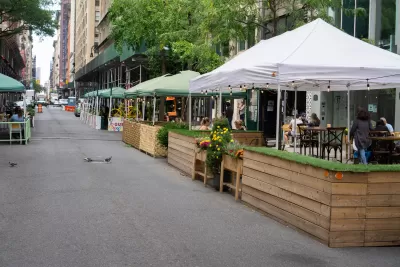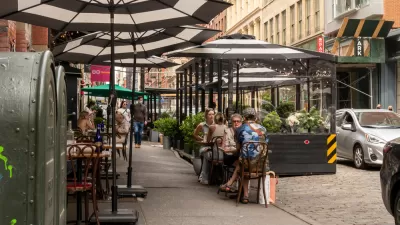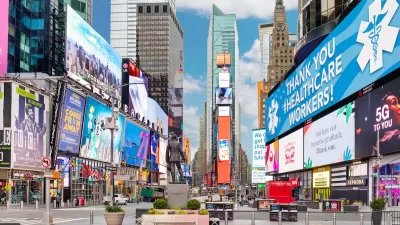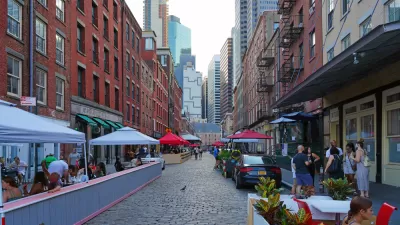The funding is designed to support open streets and public space projects in underresourced neighborhoods.

The New York City Department of Transportation (NYCDOT) will spend almost $30 million to support open streets programs around the city, with part of the money slated to help neighborhoods with lower capacity and smaller volunteer bases to maintain or create open streets in their communities.
As Kevin Duggan explains in Streetsblog NYC, “This mayor and his successor were criticized for not supporting the legions of volunteers who program the new public spaces and set up and take down barricades every day — work that some said should be done by the city.” Now, “DOT plans to spend $27 million over three years to contract managers and crews to work on one or several sites, depending on their size, helping with basic operations, like sweeping, bagging trash, moving barricades, planting, and providing access for people with disabilities.”
In the early days of the pandemic, open streets became an effective way to support local restaurants and small businesses, help people safely spend more time outdoors, and encourage community-building while adhering to pandemic restrictions. Today, only 25 of Mayor de Blasio’s promised 100 miles of open streets remain, mostly in whiter, wealthier parts of the city.
For neighborhoods with fewer resources, the daily tasks of managing open streets projects is left up to a small cadre of volunteers, and some open streets face backlash from residents and businesses, despite evidence that open streets and outdoor dining initiatives have boosted economic activity in the city. The new funding could help provide key services to communities lacking deep-pocketed business improvement districts (BIDs) or other funding sources.
FULL STORY: HOOPLA: City Adds $30M for Managing Open Streets, Public Space in Needy Nabes

Alabama: Trump Terminates Settlements for Black Communities Harmed By Raw Sewage
Trump deemed the landmark civil rights agreement “illegal DEI and environmental justice policy.”

Study: Maui’s Plan to Convert Vacation Rentals to Long-Term Housing Could Cause Nearly $1 Billion Economic Loss
The plan would reduce visitor accommodation by 25% resulting in 1,900 jobs lost.

Planetizen Federal Action Tracker
A weekly monitor of how Trump’s orders and actions are impacting planners and planning in America.

Waymo Gets Permission to Map SF’s Market Street
If allowed to operate on the traffic-restricted street, Waymo’s autonomous taxis would have a leg up over ride-hailing competitors — and counter the city’s efforts to grow bike and pedestrian on the thoroughfare.

Parklet Symposium Highlights the Success of Shared Spaces
Parklets got a boost during the Covid-19 pandemic, when the concept was translated to outdoor dining programs that offered restaurants a lifeline during the shutdown.

Federal Homelessness Agency Places Entire Staff on Leave
The U.S. Interagency Council on Homelessness is the only federal agency dedicated to preventing and ending homelessness.
Urban Design for Planners 1: Software Tools
This six-course series explores essential urban design concepts using open source software and equips planners with the tools they need to participate fully in the urban design process.
Planning for Universal Design
Learn the tools for implementing Universal Design in planning regulations.
Caltrans
Smith Gee Studio
Institute for Housing and Urban Development Studies (IHS)
City of Grandview
Harvard GSD Executive Education
Toledo-Lucas County Plan Commissions
Salt Lake City
NYU Wagner Graduate School of Public Service





























